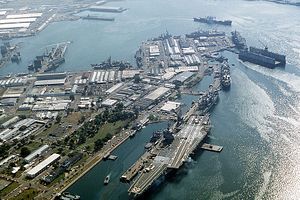During his tour of Asia in April this year, U.S. President Barack Obama stopped over in the Philippines, long a U.S. partner, to oversee the conclusion of the Enhanced Defense Cooperation Agreement (EDCA), which would allow U.S. troops to return to Filipino military bases on a temporary basis. That agreement built on the 1998 Visiting Forces Agreement, which generally allowed U.S. forces to join major military exercises in the Philippines. Recently, the legal basis for military cooperation between the United States and the Philippines has come under fire after a U.S. Marine was accused of killing a transgender Filipino this month. The incident has led to a bilateral scuffle amid criticisms from the Filipino opposition that Benigno Aquino’s government is unwilling to amend the terms of the 1998 agreement to better suit Filipino interests.
On Thursday, the Philippines’ Foreign Secretary Albert Del Rosario noted that aspects of the Visiting Forces Agreement were “imperfect.” “It’s not a perfect agreement. It’s an imperfect agreement but given that, it’s not plausible for us to amend (it) at this time,” Del Rosario remarked. “We need to abrogate and if we abrogate, it interrupts the benefit of the mutual defense treaty with regards to joint exercise[s] between our two armed forces. It consequences the modernization, the joint training, the inter-operability,” he added.
The case involving the U.S. Marine highlights the imbalanced custody provisions of the U.S.-Philippines Visiting Forces Agreement. Critics note that the agreement states that U.S. military suspects accused of having committed a crime under Philippines’ law will remain in U.S. custody until legal proceedings are completed — an affront to the Philippines’ sovereignty. Sovereignty concerns have long been of interest to Filipino politicians. Similar concerns led to the United States military giving up its permanent bases in the Philippines in the early 1990s.
Under the terms of the EDCA signed earlier this year, U.S. forces are expected to visit the Philippines more regularly. The preamble of that agreement demonstrates sensitivity towards Filipino concerns and notes that “all United States access to and use of facilities and areas will be at the invitation of the Philippines and with full respect for the Philippines Constitution and Philippine laws.” Defense Secretary Voltaire Gazmin echoed that sentiment, noting that abrogating the agreement would “have an adverse effect on the minimum credible defense posture that we are working hard to achieve.”
Meanwhile, pressure to revisit the 1998 agreement is growing in the Filipino Congress. Senator Miriam Defensor Santiago and Representative Walden Bello have filed a measure seeking a joint congressional resolution calling for the end of the Visiting Forces Agreement with the United States, according to the Manila Standard.
For the moment, the executive remains convinced that the Visiting Forces Agreement is vital for the Philippines’ national security. “The President has already stated that the Philippines needs the Visiting Forces Agreement (VFA), which forms an integral part of our national defense strategy,” noted a presidential spokesperson in a statement.

































